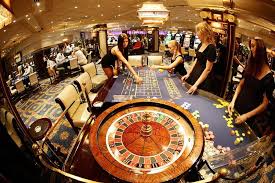What Does “The House Always Wins” Mean?

Often connected with the world of gambling venues, “the house always wins” is a term suggesting an indisputable reality about how these places run. Although the adage can inspire a feeling of inevitability or even cynicism, it also captures a mathematical idea guiding the systems of games including risk and reward. Whether the games are hosted physically or online, the house of the company hosting them is set up to keep a statistical edge over the participants. This idea is a deliberate business plan guaranteed over the long run rather than just a question of coincidence. But what does it really mean for the house to “always win,” and why does this phrase appeal so powerfully to both fans and analysts? We have to dig into the mechanics of games, the psychology of players, and the business techniques under use if we are to really understand the ramifications.
Comprehending The “House Edge”
Fundamentally, the word is about the “house edge,” a statistical advantage that guarantees gaming venues remain profitable. The house edge is basically the variation between the actual game odds and the odds offered to players. On a European wheel, for instance, the odds of landing on a single number in a basic game like roulette are 1 in 37. Still, the payback for such a wager usually runs 35 to 1. This difference guarantees that, independent of personal gains or losses, the house gets a little share of every wager made over time.
From card games to dice rolls, practically every slot online game uses this idea to guarantee that the establishment gains long-term even if players value temporary successes. The house edge could change depending on the game; some games, like blackjack with optimum strategies, have reduced house advantages, while others, like keno, may have greatly higher edges. Whatever the difference, the fundamental idea stays the same: the games are meant to benefit the house over a long run.
Short-Term Returns Against Long-Term Results
“The house always wins” seems so ubiquitous in part because it does not rule out the prospect of individual players winning. Actually, the appeal of gambling depends on the sporadic large gain being not only attainable but also natural. These events inspire people to get involved by means of storytelling, excitement, and drive. The house’s edge guarantees, however, that even if players might win temporarily, the establishment’s revenue is never jeopardized over long terms.
Think of the law of large numbers, a statistical theory that holds random event outcomes will average out over time. In gambling, this means that although a single player can walk away with a large payoff, the total results of hundreds or millions of bets will tend toward the house’s advantage. The adage “the house always wins” emphasizes the assurance of long-term revenue rather than suggesting instantaneous success for the establishment in every case.
The Psychology Behind The Games
Beyond the house edge’s arithmetic, the psychology of players is absolutely essential for the persistent truth of “the house always wins.” Games are painstakingly crafted to captivate players, extend their involvement, and inspire repeated performance. Near-miss events, strong lights, and interesting sounds help to create an environment in which players feel driven to keep playing.
One effective psychological tactic is near-misses where a player gets agonizingly close to a victory. Though officially a loss, a near-miss sets off a feeling of “almost winning,” which can inspire athletes to keep going. Likewise, the sporadic and erratic character of rewards keeps gamers interested. One of the best techniques for motivating consistent conduct is this phenomenon called variable-ratio reinforcement.
Another psychological element is the way one views chance vs skill. Skillful games like poker or blackjack let participants feel in charge of the result. With players thinking they can outsmart the system despite the natural house edge, this view can cause overconfidence. Players of pure chance games like roulette or dice also often create rituals or “lucky” actions, therefore supporting their notion that they can control results.
Business Models And Sustainability
From a commercial standpoint, the viability of gaming venues depends critically on the idea that “the house always wins”. The house edge guarantees that these locations can pay for staff wages, upkeep, licenses, other overhead charges, and running expenses. Apart from paying expenses, the edge creates continuous revenues that let the company to expand and make investments in additional attractions, marketing, and customer rewards.
Fascinatingly, the profitability model does not rely just on optimising the house edge. Many businesses understand that a good experience motivates return visits, so they concentrate on furnishing a fun and interesting surroundings. Providing freebies, loyalty programs, and immersive events guarantees a constant flow of clients and helps to keep them. This harmony between profitability and customer satisfaction emphasizes the subtle strategy to make sure the house “always wins” while keeping goodwill among players.
The Function Of Control
Moreover, the idea that “the house always wins” depends much on regulatory systems. These systems are meant to guarantee equity and openness while safeguarding operators as well as players. For instance, gaming venues are sometimes obliged to reveal the chances of their games and follow rigorous guidelines for random number generation on internet platforms. These steps ensure that players are participating in games that, although favoring the house, are not blatantly exploitative, therefore helping to preserve credibility and confidence.
The house edge is not disguised but rather freely acknowledged in controlled situations, therefore supporting the knowledge that games are meant for amusement rather than as a method of income for participants. Balancing the interests of players and operators depends on this openness, hence the “the house always wins” notion stays a fair and consistent feature of the gaming experience.
Knowledge For Gamers
For players, knowing that “the house always wins” might be a great lesson that motivates them to approach games with reasonable expectation. Players might welcome gaming as a kind of entertainment rather than seeing it as a means of financial success. Knowing the chances, creating budgets, and identifying the psychological processes in action will enable people to make wise judgments and stay clear of the dangers of following losses.
Furthermore emphasizes the need for responsible gaming the phrase also reflects Acknowledging the psychological and mathematical truths of gaming helps players avoid developing habits of behavior that cause emotional or financial trouble. Many gaming venues and platforms support responsible gaming campaigns by providing tools and resources to enable gamers to keep control over their activity.
Conclusion
“The house always wins” is a brief statement of the ideas controlling games involving risk and reward. It captures the psychological dynamics keeping players involved, the statistical certainty of the house edge, and the business plans guaranteeing long-term success. Although the term initially seems negative, it finally reminds us of the harmony between entertainment and economic reality. Understanding the meaning behind this aphorism can help players approach games with a feeling of fun and responsibility, thereby embracing the experience for what it is rather than pursuing unrealized results. Ultimately, the house’s triumph is evidence of the complex interaction among mathematics, psychology, and commerce that characterizes the universe of gaming, not only of its advantage.



